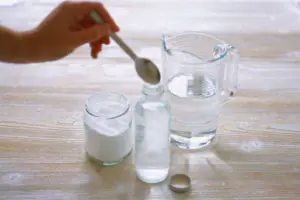In case of food and household poisoning in children, the time to provide first aid plays an important role, so any adult should know how to rinse the stomach of a child of different ages.
The content of the articleWhat is gastric lavage and when should it be done?
Gastric lavage is a medical procedure used to remove poisonous substances or toxins. This helps reduce the absorption of toxic substances by the mucous membrane and reduce their concentration in the blood. Gastric lavage in children can be done at home, using solutions of soda, potassium permanganate, and boiled water. In the hospital, the procedure is carried out using a probe - this makes washing more effective and faster.
Anyone can face the need to rinse a child's stomach. This procedure may be necessary if the baby ate/drank something poisonous, overate, developed an intestinal infection, or ate too much or the wrong food.
Important! Lavage of a child's stomach is first aid in case of poisoning. The procedure will only be beneficial if it is carried out immediately after poisoning, after the toxic substances are absorbed into the blood; the effectiveness will be minimal.Poisoning can occur in a child of any age, but each age period has its own characteristics:
- 1 – 3 year olds can be poisoned by poisonous berries, medicines, household chemicals, and food poisoning is common.
- For 3–6 years, foodborne diseases, toxic infections, poisonous plants, and medications are in the lead.
- 7 – 14 Poisoning is caused by poor-quality products, intestinal infections and poisonous plants.
- In adolescence, children may need gastric lavage due to food poisoning, overeating, or drug/alcohol poisoning.
It is necessary to rinse if:
- The child or people around him report that he ate/drank something inappropriate.
- The patient complains of nausea, abdominal pain, bloating, and vomiting.
- With severe lethargy, weakness, dizziness, accompanied by nausea, vomiting, diarrhea.
- If poisoning is suspected - if the patient has eaten poor-quality food, unknown plants, mushrooms or food that caused poisoning to other family members, the procedure is carried out for preventive purposes.
- When using any alcohol/drugs.
Also, lavage may be necessary for newborns and children under 4 months of age if they swallow amniotic fluid or have anatomical features of the digestive system, but this requires the use of a nasogastric tube. This procedure is carried out only in a medical institution.
Contraindications
You can rinse the stomach at home only if the child is fully conscious and able to follow your recommendations. The procedure is not performed if:
- Loss of consciousness
- Acute gastric bleeding or suspicion of it - the presence of blood clots, streaks of blood in the vomit, feces.
- Convulsions, epilepsy.
- Burns of the oral cavity, larynx, esophagus with acids or alkalis.
- Narrowing of the esophagus or gastric inlet atresia.
- Severe neurological disorders and diseases of the cardiovascular system.
Preparing for gastric lavage
How to rinse a child’s stomach in case of poisoning:
- Prepare a solution for rinsing - how to rinse a child’s stomach depends on the availability of the necessary components. This may be cool water. The information is for informational purposes only! Probe rinsing is a dangerous procedure that requires certain skills, so you can carry it out yourself only in exceptional cases and after consulting a doctor.
After lavaging the stomach, you need to rinse your mouth, put you on the bed and give adsorbents - activated carbon, polysorb, in an age-specific dosage. To cleanse your child's intestines, you can give an enema.
Gastric lavage is only a symptomatic treatment; depending on the cause of the pathology, the patient may need other therapy - antibiotics, intravenous infusion therapy and much more.
Washing is quite difficult for a child to tolerate, especially if he has previously suffered poisoning or an intestinal infection. Therefore, after washing, he definitely requires medical supervision, bed rest and care.



